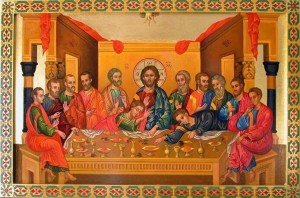It is my experience that, influenced by the sacramental theology of the Western Church, the true nature of the Divine Liturgy for many, even priests, is solely focused on the “consecration” of the gifts. Too soon do people seem to forget that the Divine Liturgy, and also other services within our Church, are designed to bring the Church into true existence. We are called to be Church, that is followers of Jesus.
To truly become Church, we must first desire and sense that we are in God’s Kingdom. Second, we must want to listen to Christ’s teaching and that of His initial followers so that we might learn how to live. Third, we must voluntarily offer our petitions, praise and worship to Him, believing Him to be a loving God. Fourth, we must believe that by praying to the Father, repeating the words of Jesus and invoking the Holy Spirit, that Jesus, soul and body, will be in our midst. That is, we must believe in His real presence. Fifth, we must, with love, receive the transformed gifts with a true and loving heart, which is demonstrated by our willingness to unconditionally love and forgive all others, regardless of what we think they have done to us. And last, we must want to make God’s Kingdom real by how we live as we go forth from our encounter with Jesus.
Having shared all this, I am saying that the focus is not just on the changing of the bread and wine into the real Body and Blood of Christ so that He is truly present in our midst, but also on how this Divine Liturgy changes us.
The history of the Church has been filled with great struggle concerning the meaning of the true presence of Christ in the transformed gifts. Of course there was also a great struggle in the Church to understand Who Jesus really is. There has always been a tendency to either make Him more God than Man. This same struggle, I think, has been within Christianity concerning the Eucharist.
We must guard against reducing the Divine Liturgy just to the act of transforming the gifts. In order to do this, we must first understand the idea of a symbol. It has long been normal to speak of the symbolism of our worship. We can hardly doubt that our Divine Liturgy is symbolic. But what is understood by this term is very important.
More to come!

